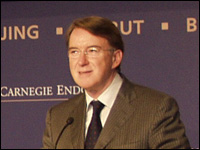Registration
You will receive an email confirming your registration.
IMGXYZ812IMGZYXIn a speech at the Carnegie Endowment, EU Commissioner of Trade Peter Mandelson argued that the European Union and the United States must use their collective economic weight to underwrite the openness of the global economy as its adjusts to the rise of new economic powers and greater global flows of investment. Mandelson said that the U.S. and the EU should use their own openness to "underwrite a strong multilateral order based on cooperation and economic openness."
IMGXYZ807IMGZYXSpeaking on the eve of the first Transatlantic Economic Council (TEC) meeting, Mandelson argued that the EU and the U.S. must make the case for open trade and investment at home and abroad – not least through their own policies. Arguing that "the preservation of an equitable economic globalisation should be the core political commitment at the heart of the transatlantic economic relationship" he called on U.S. and EU policymakers to "engage with economic globalisation, accept it, shape it."
Mandelson welcomed the creation of the TEC and said that it would direct a detailed work programme designed to tackle important non-tariff barriers in EU-U.S. trade and host a serious dialogue on investment rules. He argued that the TEC should also be at the centre of an EU-U.S. dialogue on key global economic challenges. Mandelson identified:
- China, where he argued that the EU and the U.S. should acknowledge China's global trade power status and deal with it as they would any other major trading power: expecting reciprocal openness, and enforcing obligations where they are not met.
- Sovereign Wealth Funds, where he argued against a protectionist response in the EU and the U.S. to inward investment. He argued that the need for transparency for state-backed investment required an internationally agreed set of principles for investors and recipients of investment.
- The Doha round of trade talks, where he argued that a successful deal would not only create new trade but be a decisive step in reforming farm trade in the developed world, bring the large emerging economies firmly into the multilateral trading system and show that a global consensus was possible on open trade.
For more information on the EU-U.S. trading relationship, see http://ec.europa.eu/trade/issues/bilateral/countries/usa/index_en.htm
